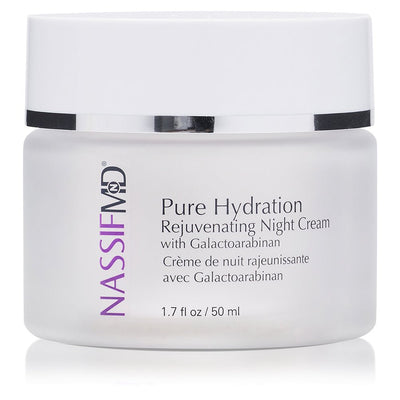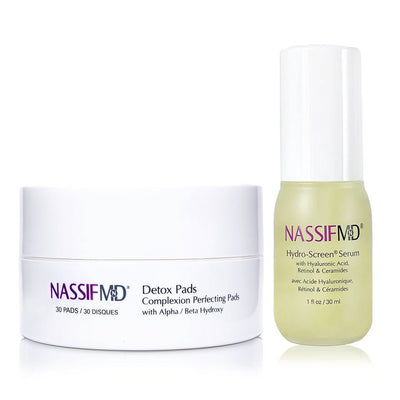A Facial Plastic Surgeon’s Guide to Skin Barrier Protection: Why Ceramides, Hyaluronic Acid, and Retinol Matter
No one knows more about the skin barrier than a plastic surgeon. With an up-close, front-row view of the skin barrier, Dr. Nassif understands skin structure and function, what can go wrong, and how to optimize skin barrier repair for smooth, healthy, younger-looking skin.
While plastic surgery can address specific skin concerns, it can’t heal the skin barrier, which is why Dr. Nassif created NassifMD® facial plastic surgeon skincare. Use NassifMD® Skincare products in conjunction with plastic surgery or on their own to improve skin health and protect the critical skin barrier.
In this article, we’ll discuss how to repair the skin barrier and why ceramides, hyaluronic acid, and retinol are must-have ingredients in your skincare routine, along with a deeply nourishing skin barrier cream. Keep reading as we explore:
-
What is the skin barrier?
-
What are ceramides? Ceramides for skin
-
What is hyaluronic acid?
-
Retinol serum for skin barrier damage
-
Damaged skin barrier signs
-
How to heal the skin barrier with NassifMD® Skin Barrier Protection Cream
Skin Barrier Function: Its Role in Anti-Aging
The skin barrier is the outermost layer of skin, mainly made from lipids, and is stronger than other skin layers. It forms a physical barrier between the body and the external world and is an important, protective piece of the immune system. It’s integrated with the skin microbiome (microorganisms living on/in the skin barrier); these organisms are essential for maintaining the acidic skin barrier environment and skin health.
A compromised skin barrier leads to water loss, oxidative stress, and the potential for skin damage from sun exposure, pollution, and toxins. Maintaining a healthy, well-functioning skin barrier is critical for slowing the aging process and is a key component of anti-aging skincare. Let’s discuss how to restore the skin barrier with targeted, active skincare ingredients.
Ceramides: Repairing the Skin’s Brick and Mortar
Ceramides are a primary lipid found in the skin, along with fatty acids and cholesterol; think of them as the building blocks of skin structure. Along with providing physical structure to the skin barrier, ceramides have many essential functions, including:
-
Maintaining hydration
-
Regulating pH
-
Managing inflammation
-
Enhancing other skin functions
-
Improving appearance
As a topical skincare ingredient, ceramides offer many benefits for skin health and the management of skin conditions. They are used frequently by dermatologists, aestheticians, and plastic surgeons alike as ceramide moisturizers or serums. Ceramides may be part of a treatment approach for dry skin, atopic dermatitis, and various inflammatory skin conditions, and work by enhancing the skin barrier.
Find ceramides in NassifMD® Hydro-Screen Serum, along with hyaluronic acid and retinol, which we’ll discuss next.
Hyaluronic Acid: Hydration and Barrier Resilience
As one of skincare’s most hydrating ingredients, hyaluronic acid benefits don’t end there. Hyaluronic acid serum also supports a damaged skin barrier, and you’ll find it in various skin barrier repair products.
When you have a broken skin barrier, water evaporates from the skin’s surface (trans epidermal water loss) instead of remaining in the skin. Hyaluronic acid helps to restore skin hydration by binding to water molecules and pulling them deep within the skin. Hyaluronic acid has regenerative and anti-aging effects due to its biological activity. It’s also safe for all skin types.
Find hyaluronic acid in the best hyaluronic acid serum, NassifMD® Hydro-Screen Serum, and in many products throughout the NassifMD® Skincare line.
Using Retinol Without Damaging the Skin Barrier
Retinol, an active form of vitamin A, is a star anti-aging ingredient, and you’ll find it in everything from retinol cream to the best retinol serum. It’s known for its anti-wrinkle activity, reducing fine lines and wrinkles and improving skin texture. Retinol also helps repair the skin barrier, strengthening its protective functions, reducing water loss, and promoting collagen production.
The skin can be sensitive to overuse of retinol, especially at first, so it’s good to pay attention to how your skin responds to get the most skin barrier benefits. Begin using retinol at night a few days per week and increase gradually as tolerance improves. Be sure to moisturize after retinol and wear sunscreen.
Find retinol in our skin barrier serum: NassifMD® Hydro-Screen Serum. Retinol is also a key ingredient in NassifMD® Detox Facial Pads and NassifMD® Night Therapy Serum.
Signs of a Compromised Skin Barrier and Fixes
If your skin barrier is healthy, you’ll notice clear, resilient, healthy, and well-hydrated skin. On the other hand, damaged skin barrier symptoms include:
-
Dryness
-
Redness
-
Irritation
-
Inflammation
-
Flare-ups of skin conditions like eczema
-
Increased skin sensitivity
NassifMD® facial plastic surgeon skincare offers the best skin barrier repair products. Begin with active ingredients that support skin barrier repair, such as ceramides, hyaluronic acid, and retinol. You’ll find all three ingredients in NassifMD® Hydro-Screen Serum.
Additionally, finish your nightly skincare routine with NassifMD® Skin Barrier Protection Cream, a thick, comforting, and moisturizing skin barrier repair cream. It creates a protective coating over the skin barrier, locking in other ingredients and skincare products you use in your routine. With anti-inflammatory and hydrating extracts, niacinamide, panthenol, and sunflower seed oil this nourishing cream aids in barrier repair and deep skin hydration.
Understanding and nourishing the skin barrier is critical for skin health and a vibrant, youthful appearance. With just a couple of steps and the help of NassifMD® Skincare, you can transform your skincare routine to enhance skin barrier function and reveal your best skin yet.
References
-
Lee, H. J., & Kim, M. (2022). Skin Barrier Function and the Microbiome. International journal of molecular sciences, 23(21), 13071.
-
Coderch, L., López, O., de la Maza, A., & Parra, J. L. (2003). Ceramides and skin function. American journal of clinical dermatology, 4(2), 107–129.
-
Yong, T. L., Zaman, R., Rehman, N., & Tan, C. K. (2025). Ceramides and Skin Health: New Insights. Experimental dermatology, 34(2), e70042.
-
Juncan, A. M., Moisă, D. G., Santini, A., Morgovan, C., Rus, L. L., Vonica-Țincu, A. L., & Loghin, F. (2021). Advantages of Hyaluronic Acid and Its Combination with Other Bioactive Ingredients in Cosmeceuticals. Molecules (Basel, Switzerland), 26(15), 4429.
-
Zasada, M., & Budzisz, E. (2019). Retinoids: active molecules influencing skin structure formation in cosmetic and dermatological treatments. Postepy dermatologii i alergologii, 36(4), 392–397.

























